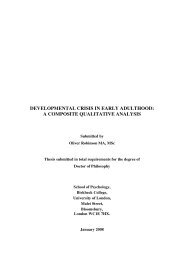student handbook: general information 2010-2011 - University of ...
student handbook: general information 2010-2011 - University of ...
student handbook: general information 2010-2011 - University of ...
Create successful ePaper yourself
Turn your PDF publications into a flip-book with our unique Google optimized e-Paper software.
19 GLOSSARY<br />
APL/APEL: Accreditation <strong>of</strong> Prior Learning or Accreditation <strong>of</strong> Prior Experiential<br />
Learning. (See section 9 <strong>of</strong> this <strong>handbook</strong>).<br />
Banner and BannerWeb: The BANNER Student System is used to manage all <strong>student</strong><br />
record data within the <strong>University</strong> and contains details <strong>of</strong> all courses and programmes on<br />
<strong>of</strong>fer within the <strong>University</strong>. You can view all your personal details and your results via<br />
BannerWeb. (See section 7 <strong>of</strong> this <strong>handbook</strong>).<br />
Courses: They are the basic components <strong>of</strong> your programme. The title and code number<br />
<strong>of</strong> the courses constituting your programme are in the course structure diagram in section 4<br />
<strong>of</strong> this Handbook. Each course has its own learning and teaching programme, and learning<br />
outcomes, and is individually assessed. The credit rating for each course varies, i.e., some<br />
courses are worth 15 credits, others 20 or 30 or 45 etc. Most courses are core courses.<br />
Some programmes <strong>of</strong>fer option or elective courses. Please access the course<br />
specifications/definitions <strong>of</strong> the courses you are taking, via BannerWeb or via the<br />
university portal (see section 9 <strong>of</strong> this <strong>handbook</strong>).<br />
Course Co-ordinator: The tutor who co-ordinates teaching, learning assessment and<br />
feedback for a course.<br />
The <strong>University</strong> <strong>of</strong> Greenwich Portal: It’s the <strong>student</strong>’s key point <strong>of</strong> access to services<br />
such as email, <strong>student</strong> records and the Library’s online catalogue and journals. Once<br />
registered, all <strong>student</strong>s will be able to login to the <strong>University</strong> <strong>of</strong> Greenwich Portal at<br />
http://portal.gre.ac.uk or via the university home page. (See Section 7 <strong>of</strong> this <strong>handbook</strong>).<br />
Induction: a short period at the very beginning when you will be given the opportunity to<br />
find out more about your work and leisure in the <strong>University</strong>.<br />
Learning Outcomes: Students’ learning experiences are expressed in terms <strong>of</strong> what they<br />
can be expected to do, know and understand.<br />
Level (Academic Level): As you progress through your programmes the courses become<br />
more complex, more demanding, i.e., they move up a level.<br />
The level <strong>of</strong> a course indicates its seniority within the Programme Curriculum.<br />
The Framework is divided into a series <strong>of</strong> sequential levels which relate to the standards<br />
<strong>of</strong> work and not necessarily to the year in which the course is taken during a programme<br />
<strong>of</strong> studies; At each level awards are available in line with the Framework for Higher<br />
Education Qualifications (FHEQ) .<br />
An appropriate level shall be assigned to a course according to the following definitions:<br />
Level 0 Access to Higher Education.<br />
Level 4 (previously called level 1) Provides basic knowledge, skills and competence.<br />
Level 5 (previously called level 2) Builds on Level 4 and involves an extension and<br />
reinforcement <strong>of</strong> theoretical and/or practical aspects <strong>of</strong> knowledge.<br />
Level 6 (previously called level 3) Reflects the synthesis <strong>of</strong> basic knowledge, skills and<br />
competence and equips <strong>student</strong>s with tools <strong>of</strong> analysis and evaluation. Contributes to the<br />
Individual’s distinctive pr<strong>of</strong>essional development, where appropriate.<br />
Level 7 (previously called level M or Master level) Provides opportunity to demonstrate<br />
(i) the ability to reflect on the significance and inter-relationships <strong>of</strong><br />
38
















